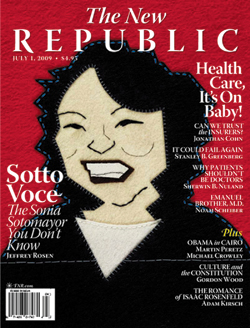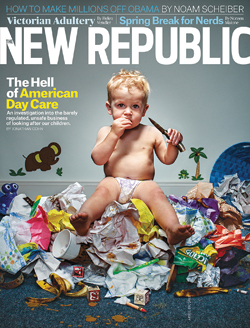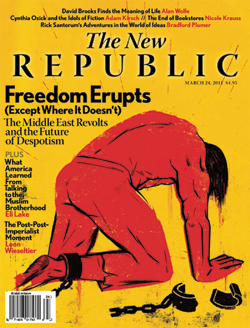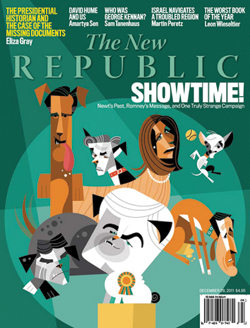
New directions After assuring the staff that he planned no major changes, Hughes began to talk about The New Republic as a brand–one that could include its own coffeehouses and stores, and make a profit. (Jonathan Wiggs / The Boston Globe / Getty Images)
On Thursday, December 4, Frank Foer resigned as editor of The New Republic, having learned from a gossip site that the magazine’s owner, former Facebook executive Chris Hughes, had already hired someone to replace him. Leon Wieseltier, who was widely known to be on the chopping block, and whose renowned back-of-the-book Hughes had already threatened, followed suit. The next morning, 15 top editors, including me, and 13 contributing editors, resigned.
Most of my colleagues quit out of solidarity with Foer, whom we believed had been rudely forced out without good reason. I shared their rage at the way Hughes had dealt with Foer. But I had stayed through other firings–most recently that of my friend Richard Just, who had recruited Hughes to buy the magazine three years ago. What made this different is that the the firings were inextricably tied to Hughes’ embrace of a new profit-driven model for The New Republic that threatened the vital role that it and other political magazines have played in American democracy.

These magazines created a public space for informed debate about the country’s direction. Unlike for-profit enterprises, they were insulated from the immediate pressures of the market. They took positions, but stood above both parties and interest groups; in contrast to talk radio or many internet blogs, they based these opinions on expertise and reporting. Nor did they draw a sharp distinction between politics and culture. Some were on the left, like The Nation or The Progressive; others on the right, like National Review and The Weekly Standard.
Hughes made clear that he was abandoning this role for The New Republic. To supervise Foer, he hired a CEO, Guy Vidra, whose only experience on political magazines had been consulting for The Daily Caller, a far-right website whose views are antithetical to those of the magazine he was being hired to run. And with Hughes’ approval, Vidra had hired a former editor of Gawker to replace Foer. In describing how they wanted to change The New Republic, Hughes and Vidra portrayed it as a promising high-tech startup, which was tied to a New Republic investment fund for digital businesses. That represented a stark betrayal of what Hughes had promised when he had bought The New Republic.
[Political] magazines created a public space for informed debate about the country’s direction.
The New Republic appeared in November 1914, just as the war in Europe was beginning. Its principal founder was Herbert Croly, whose book The Promise of American Life had helped inspire Theodore Roosevelt and the Progressive Party’s “new nationalism.” Croly wanted a journal that would reach the opinion-making classes. It wouldn’t emphasize news, but rather “give certain ideals and opinions a higher value in American public opinion.” It would be “disinterested”–meaning that it would be above party, politician, or interest group. Croly had planned to promote Roosevelt’s candidacy for presidency in 1916, but within a year had quarreled with Roosevelt over an editorial in the magazine. “The New Republic never pretended to be a party organ,” he wrote Roosevelt, “and its whole future success in life depends upon the impression it makes upon its readers of being able to think disinterestedly and independently.”
Croly and the other editors were embracing a central tenet of upper-class progressivism: that through promoting informed opinion, based on social science, they could guide the US through the shoals of class conflict and war. The Brookings Institution, the Council on Foreign Relations, The New York Times, and later Eugene Meyer’s Washington Post embraced the same ideal of disinterestedness. But where the think tanks and newspapers often tried to steer clear of being identified with a particular politics, the magazines attempted to articulate a political path forward for the country.
Sometimes, they played a transformative role in shaping public debate. The New Republic staked out and won support for progressive internationalism in its first five years; from 1955 to 1962, National Review was singularly responsible for creating an American conservatism. At other times, these magazines contributed significantly to the national debate–The New Republic and The Nation in the 1930s; The New Republic and The Weekly Standard in the years leading up to George W. Bush’s invasion of Iraq; and The New Republic again during Barack Obama’s first presidential campaign. The magazines’ relevance depended upon a match between its broadly articulated worldview and the actual options that the country faced.
Few of these political magazines have ever made a profit. I remember one year in the 1980s when The New Republic broke even. While William F. Buckley Jr. was editor of National Review, it never made money. Unlike general interest or specialized magazines, the political magazines have difficulty selling ads. Their circulations are not large enough, and they don’t have defined readerships. Plus, a dependence on ads can also limit their editorial freedom. (Last October, Amazon pulled its ads from The New Republic in response to Foer’s critical cover story about the company.)

In addition, political magazines suffer from Baumol’s Law, which states that in some industries productivity invariably fails to keep pace with wages and salaries, so that costs constantly threaten to exceed revenues. The musicians in a string quartet are paid roughly commensurate with their education and place in society; but unlike an auto worker, they don’t keep producing more products at a higher rate. Writing is that kind of profession, and while writers and editors’ pay has generally not kept pace with that of lawyers or doctors, it has risen enough to force up the costs of producing publications. The result is that without being able to depend on rising ad revenue, or higher subscription prices, these publications constantly face deficits that they have to make up either through the beneficence of their owners or through fundraising. The internet has not improved matters. While it has dramatically lowered the cost of physical production, it has taken a bite out of subscription revenue and advertising rates.
In an op-ed for The Washington Post, Hughes dismissed the idea that The New Republic was a ‘public trust and not a business.’ But that’s exactly what it was, and he violated it.
Political magazines have generally been owned by people who are willing to make up annual deficits and who are not wedded by their wealth to a particular industry that they feel they must protect from criticism. The first owners of The New Republic were Willard Straight, a partner in J.P. Morgan & Co., and his wife Dorothy (Whitney), a wealthy heiress. Willard Straight died of influenza in 1918, and his wife funded the magazine until 1953, when she sold it to Gilbert Harrison. Harrison and Martin Peretz, who bought the magazine in 1974, both married heiresses. Like the Straights, they tolerated annual deficits, and while being active in editorial policy, kept the magazine free, for the most part, of attachment to parties or particular business interests.
In 2001, Peretz, who said he could no longer afford the annual losses, recruited a succession of partners and investor groups. By 2012, the latest consortium had grown weary of funding the magazine and were threatening severe budget cuts and layoffs. Richard Just recruited Chris Hughes, who had been Facebook founder Mark Zuckerberg’s roommate at Harvard, and had made $700 million from stock in the company that he had acquired while acting as its spokesman. The editors, including me, welcomed the purchase of the magazine by Hughes, who promised not to alter its role. But over the last two years, he abandoned that role.
When Hughes took over TNR, I was on leave finishing a book, but I went out for coffee with him and we had an extended email exchange about the magazine’s future. I was pleased to talk to him. Peretz and I had not been on speaking terms, largely because of our differing views of Israel. Hughes looks even younger than his age, and displays on first meeting a cheery gee-whiz enthusiasm. But as I learned, he is perfectly capable of lashing out at subordinates if he doesn’t get his way. Over the next two years, I also learned that his eagerness in seeking advice about the magazine’s future concealed a yawning confusion about what he was doing.

Peretz, to his credit, had understood that TNR would never make a profit, and one of the first things I asked the succession of owners he recruited was whether they thought a profit was possible. Several of them failed my test, but Hughes did not. He said he wasn’t interested in making money, only in reducing the magazine’s annual losses. Hughes had told The New York Times something similar. “Profit per se is not my motive. The reason I’m getting involved here is that I believe in the type of vigorous, contextual journalism that we–we in general as a society–need,” he said. That was enormously reassuring to me.
Hughes also insisted that he wanted to preserve The New Republic as a political magazine, and seemed to understand what that meant. “The magazine has to be a political magazine–as you know better than I, TNR has always been a platform for a certain kind of American liberal sentiment, and that can’t go away,” he wrote me in April 2012. He also wanted the magazine to continue having editorials and insisted to the surprise of Just, whom he had assured of editorial control, that he wanted to write half of them himself and approve the rest. The only areas on which Hughes and I disagreed were the back of the book–he was already unhappy with the length and subject matter of the reviews and, ironically, about the importance of the Web. While I warned that TNR should pay more attention to bolstering the Web and that we would sooner rather than later have to abandon the print magazine, Hughes, who was enamored of the print magazine, claimed the day of reckoning was at least seven years away.
By the end of 2012, Hughes had replaced Just with Foer, who had been the editor from 2006 to 2010. He was continuing to focus on strengthening the print magazine–a redesigned New Republic was slated for January 2013–but he had begun to shift away from his original conception of it as a political magazine. In a presentation to the staff, Hughes stacked the rivals to The New Republic on four levels, from “d” to “a.” At the bottom were political magazines like The American Prospect, The Nation, and National Review. At top were The Atlantic Monthly, The New Yorker, and New York. Hughes explained that he wanted The New Republic to go from “d” to “a.” Some of my colleagues were excited by the plan, but that was when my doubts about Hughes’ business acumen and political commitment began.
The Atlantic, The New Yorker, and New York are not political magazines. They are “general interest” magazines that in the case of The New Yorker and New York tilt leftward in their political coverage. They each have several hundred thousand subscribers. The New Republic at the time had about 40,000–down from the 100,000 or so it had had during the early 1990s. The New Yorker and New York served, and provided services to, a wealthy readership in a defined locale, which made it easer to sell ads. And over decades, The Atlantic‘s owner had forged a network of conferences and high-priced consultancies to defray the magazine’s losses. The New Republic had none of these advantages, but Hughes was determined to press forward with his plan.

Hughes added a score of new staff, rented high-priced offices in Washington and New York. He doubled the magazine’s size and printed it on heavy, glossy paper adorned with art and photography. At the same time, Hughes now talked of The New Republic as a “company” with a “brand” to promote. In a speech at Harvard in January 2013, he broached a plan for New Republic coffeehouses and stores. He also pressed forward with New Republic conferences, and tried to bolster subscription sales. He said he hoped that the magazine, which had been losing several million dollars a year, would become profitable as early as 2015. “The New Republic can no longer be just a magazine, he declared. “We are a media company that produces live events featuring our staff and other experts, a responsive website designed for social conversations and a mobile life, audio versions of all of our work, a cutting-edge tablet app, and, of course, 20 print issues a year. We provide access to all of our products for one price to make it as simple as possible to subscribe.” The magazine itself had become a “product.”
Hughes shifted The New Republic away from its role as a political magazine. The new design did not include editorials. And in his letter to subscribers, heralding the relaunch, Hughes conspicuously excluded any mention of the magazine’s commitment to liberalism or progressivism. The articles Foer chose to publish continued to reflect the magazine’s political commitments, but the spirit that animated those commitments was slowly being drained away. Without editorials, editorial meetings were no longer devoted to hashing out issues. Instead, they consisted of editors suggesting what would be interesting “takes” for the magazine or the Web on the issues of the day. Once trying but invigorating, they became boring.
By early 2014, it was obvious that Hughes’ plan to transform The New Republic into “The New Yorker of Washington” had failed abysmally. Subscriptions had increased only incrementally and had plateaued in the mid-double digits. As a result, Hughes now turned his attention to the Web, and tried to create what one of my colleagues called “a high-metabolism, traffic-crushing Web entity.” Hughes badgered Foer and the Web editor Michael Schaffer to publish “snackable content” that would increase “unique visitors” to the website, which would help raise the price of ads. In practice, that meant abandoning the magazine’s commitment to high-quality and informed writing for quick takes that would draw visitors. According to Foer, Hughes particularly liked one writer who wrote articles entitled, “It’s now more Socially Acceptable for Men to Diet than Women,” and “People Who Love Crossfit and ToughMudder aren’t Crazy.”
Hughes’ final step was to hire Vidra as the CEO against Foer’s wishes. Foer now had to report not only to Hughes but to Vidra. In an email introducing himself, Vidra complimented the staff on “the mindshare you’ve managed to grab” and described The New Republic as a “thriving business.” A month later, Vidra held a meeting with the staff at which he explained in high-fashion digitalese his goals for the business. He put on a whiteboard an outline of the “core pillars” of the new business: “invest,” “innovate,” “metabolism,” “data-driven.” He promised to “change some of the DNA of the organization.” He called for “cost-functional collaboration.” He described The New Republic as a “hundred-year-old startup.” And he promised Facebook-style stock options for the employees in the new business, so that “every employee has an ownership stake in the company.”
When I asked Vidra whether the magazine still had a political role, he responded evasively that he wanted “great content across a wider spectrum.” He described himself as a “wartime CEO” and said he wanted to “break shit.” When one of the staff asked him what shit he wanted to break, he admitted that he didn’t know yet. Afterward, I asked Hughes, who had reiterated Vidra’s promise of stock options, whether he was now thinking of The New Republic as a media business that would make a profit, and he replied “absolutely.” Even before the fateful meeting, Vidra had already begun hunting secretly for a new editor to replace Foer.
In the wake of the firings and resignations, Ezra Klein, the editor of Vox, argued that “policy magazines” like TNR were destined to fail because of the economics of the Web, and that Hughes had been correct to shift it to the Web. But Klein, whose column reeked of self-promotion, did not understand what was at stake. The New Republic had never been a “policy magazine” like, say, The National Journal. It was a political magazine that aimed to shape where the country was headed. Vox is a snappy, digital version of a think tank bereft of ideology and able to court advertisers and corporate sponsors in a way that political magazines never could. It could potentially be profitable. Attempting to turn The New Republic into a profit-making vehicle would destroy it.
In addition, the controversy was not about the transition from a print to a Web magazine. Most of the editors, with the exception, perhaps, of Wieseltier, accepted that the magazine would move gradually to the Web. It was Hughes who had been slow to understand this transition, and when he finally realized that it was necessary, attempted to make it with little thought of preserving The New Republic‘s political and intellectual role. Looking back, I am convinced that Hughes was out of his depth from the start. Instead of allowing the magazine to change incrementally, while he learned how to run it, he attempted to transform it immediately from “d” to “a”–into “The New Yorker of Washington”–and when that failed, into simply another profit-making Web entity. There remains, I believe, an important role for the magazines in the ignominious “d” slot occupied by The Nation and National Review. They won’t make a profit, but with the right owner or owners, they can operate with acceptable losses and play a significant role in American democracy.
There is a historical lesson, perhaps, in Hughes’ failure at the helm of The New Republic. The original money for the magazine came primarily from Dorothy Whitney Straight, whose father was a leading investor in steel, street railways, and real estate. Gilbert Harrison’s wife was an International Harvester heiress, and Peretz’s wife got her money from Singer Sewing Machine. These were older American companies that emerged after the civil war. Many of their owners had been described as “robber barons.” In their old age, some of them, chastened by labor strife and public criticism, had devoted themselves to philanthropy and to what they understood as the public interest; and their heirs and heiresses, like Dorothy Straight, had followed suit.
Hughes is a member of a new generation of fabulously wealthy American capitalists who made their money in the cybersphere. Since he left Facebook in 2007, Hughes had been trying to put his fortune to good use, and turned to buying a venerable political magazine that was in danger of going under. His intentions were good. But like others from this generation, when he ventured outside of Silicon Valley, he didn’t know what he was doing, and his commitment to social responsibility turned out to be skin-deep. In an op-ed for The Washington Post, he dismissed the idea that The New Republic was a “public trust and not a business.” But that’s exactly what it was, and he violated it.
Correction: An earlier version of this article said Dorothy Whitney Straight was a Standard Oil heiress.
John B. Judis was a senior editor at The New Republic.
